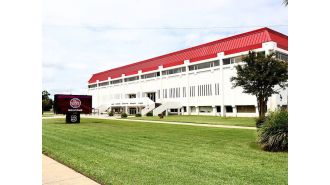Congresswoman Pressley proposes legislation to safeguard prison staff and inmates from dangerous environmental conditions.
New law may require agencies to publicly disclose environmental hazards.

Representative Ayanna Pressley has introduced a new bill that aims to address the environmental hazards facing prison workers and inmates. The Environmental Health in Prisons Act would require the Federal Bureau of Prisons to establish an independent advisory board responsible for researching and addressing various threats to the environment within prisons, such as air and water quality, mold presence, contagious diseases, and extreme temperatures.
The advisory board would be tasked with providing recommendations on how to mitigate these hazards, offering reports that outline protective measures. The bill is co-sponsored by Senator Edward Markey, another Democratic lawmaker from Massachusetts, with the goal of improving the environmental health outcomes for those living within prison walls.
A study published in 2017 found that several Superfund sites, which are designated to address hazardous waste, were located near prisons. Representative Pressley emphasized that incarcerated individuals deserve to have their dignity and humanity respected, including access to clean air, water, and living environments. She stated, "As we work to dismantle our shameful mass incarceration crisis, our bill would affirm the fundamental right to a safe and healthy environment for every person behind the wall."
The COVID-19 pandemic has highlighted the poor conditions within prisons, with experts linking inadequate facility ventilation to higher infection rates among inmates. The Prison Policy Initiative found that nearly half of all prisons in the United States do not have adequate air conditioning, with the majority of these facilities located in the South and Midwest.
Additionally, a study revealed that close to one million incarcerated individuals are at risk of long-term health effects due to exposure to "forever chemicals" in water sources near prisons. Senator Markey emphasized the need to ensure that those currently incarcerated have access to clean air, water, and living environments, and are treated with dignity and respect. He stated, "As we work to reduce the number of people behind bars, we must also ensure that those currently incarcerated have access to clean air, water, and living environments."
If passed, the bill would require agencies such as U.S. Immigration and Customs Enforcement, U.S. Marshals Service, and the Bureau of Indian Affairs to make any exposure to environmental hazards public. It would also establish a grant program for state, local, and tribal facilities to collect data on inadequate conditions in state prisons and jails.
Advocates for prison rights have welcomed the bill, with inmate William Ragland, who heads the African American Coalition Committee at MCI-Norfolk, expressing hope that the data collected will shed light on the persistent racial disparities within prisons. "Incarcerated people are often subjected to the worst conditions when it comes to food, healthcare, and environmental protection. But these inequities do not just affect those behind bars," Ragland stated. "Toxic prison environments are a continuation of the pollution that disproportionately affects Black communities in Massachusetts and across the country."
In related news, Representative Pressley has accused Walgreens of racial and economic discrimination amid the closure of several stores in her district in Boston. She has called on the company to provide a detailed explanation for these closures and to take action to address any potential discrimination. This issue further highlights the need for legislation such as the Environmental Health in Prisons Act to protect marginalized communities from environmental injustices.










